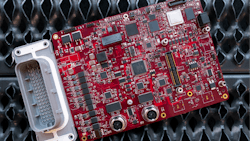Startup Taps NXP Processors to Enable Safer Self-Driving Trucks
Autonomous trucking startup Kodiak Robotics has integrated NXP's automotive processors and in-vehicle networking interfaces to enhance the performance, reliability, and safety of its self-driving platform.
The integration centers on NXP’s S32G3 in-vehicle network processor and S32K3 microcontroller (MCU), both of which are embedded in the Kodiak Actuation Control Engine (ACE). ACE is a custom-designed computer that operates independently of the main autonomous driving stack. It ensures that if any key component of Kodiak Driver, the company's AI-driven autonomous system, or the truck platform itself fails, the truck can still perform a safe fallback maneuver and come to a controlled stop.
Kodiak said the NXP solutions not only support redundant control of the steering, braking, and other driving functions, but they also enable a broad suite of safety and monitoring capabilities. Kodiak Driver can assess the performance of more than 1,000 safety-critical processes and components across its self-driving stack and the truck itself — at a rate of 10 times per second. The NXP chips also support critical safety functions, such as in-vehicle power management, reinforcing the system's overall reliability.
High-performance AI hardware such as NVIDIA's Thor module is central to self-driving cars. But it isn't all that matters. NXP aims to complement them with real-time, safety-critical processors in its S32 lineup. For instance, the company has introduced the S32N, the first in a family of "super-integration" processors. These chips are designed to consolidate a wide range of real-time control tasks by isolating them in separate software modules, enabling more rapid and reliable execution of vital safety functions.
Bringing Safety Measures to the Forefront
Kodiak said the NXP solutions stand out for their deterministic, real-time performance, which is critical to improving the company's precision control over everything from safety processing to power management.
“Autonomous driving systems demand a level of safety and reliability that leaves no room for compromise," said Robert Moran, GM and VP of Automotive Processors at NXP. "Our ISO 26262-compliant S32 compute solutions are designed to support that level of rigor — delivering the real-time performance and functional integrity needed to help companies like Kodiak bring advanced autonomous capabilities to market with confidence."
The high-performance S32G3 enables safe actuation of vehicle controls, including redundant throttling, braking, and steering. The real-time Arm Cortex-M7 MCU cores and Arm Cortex-A53 CPU cores at the heart of the processor run in lockstep for safety or separately to execute software independently. Kodiak uses one of NXP's ASIL D voltage regulators to deliver optimal power to the S32G3.
To handle the huge amounts of data moving around the vehicle, the SoC contains a programmable network accelerator that can run everything from controller area network (CAN) and local interconnect network (LIN) buses to automotive Ethernet. It also features PCIe interfaces to connect to accelerators or other high-performance silicon. The Hardware Security Engine (HSE) inside it — and the rest of the processors in the S32 lineup — acts as the root of trust (RoT) in the system, supporting secure boot.
The startup also leverages NXP’s S32K3 family of microcontrollers as safety co-processors in the ACE. They are also used to coordinate power distribution, control battery charging, and support safety HMI interfaces.
Kodiak incorporates the VR5510 multichannel, high-voltage power-management IC, primarily to enable high-performance power generation, including functional-safety mechanisms to monitor output voltage.
By supporting the self-diagnostic capabilities under the hood, Kodiak said the NXP solutions further enhance the reliability and robustness of Kodiak's self-driving trucks, reducing unnecessary downtime. NXP's solutions also meet the most stringent ISO 26262 safety integrity level: ASIL D. According to Kodiak, the ASIL D standard corresponds to a rate of fewer than 10 hardware failures for every billion hours of operation.
Said Don Burnette, Founder and CEO of Kodiak, "Driverless trucks require powerful and reliable safety-critical computing platforms which meet our rigorous safety standards. By incorporating NXP's automotive solutions into the Kodiak Driver, we are positioned to incorporate the highest classification of automotive safety into our autonomous system more efficiently, and at scale."
Kodiak also highlighted the wide range of vehicle interfaces present in the NXP solutions, which could give the company a flexible and cost-effective way to adapt the Kodiak Driver to additional vehicle platforms.
Founded in 2018, Kodiak is a startup developing self-driving technology for semi-trucks, and it offers autonomous trucking operations to customers in a model where customers pay per mile or vehicle. The company has deployed its first customer-owned and -operated autonomous trucks, which are delivering freight autonomously on real-world routes, both day and night, and in most weather conditions.
About the Author
James Morra
Senior Editor
James Morra is the senior editor for Electronic Design, covering the semiconductor industry and new technology trends, with a focus on power electronics and power management. He also reports on the business behind electrical engineering, including the electronics supply chain. He joined Electronic Design in 2015 and is based in Chicago, Illinois.

